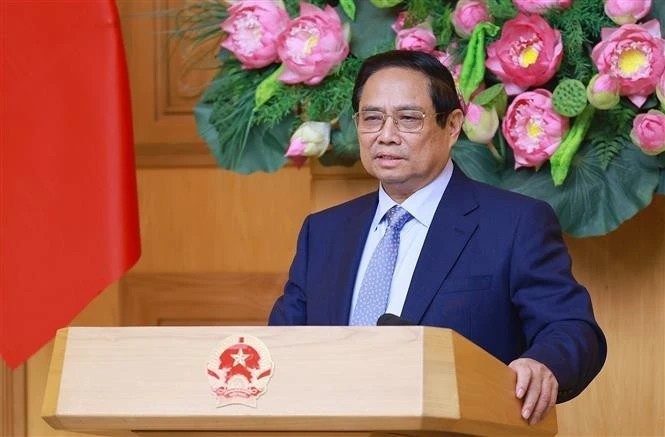Actions called for addressing population ageing in Vietnam
(VNF) - Policy makers and experts gathered at a talk show themed “Responding to the Ageing Population in Vietnam: The Way Forward” held in Hanoi on October 1 to discuss measures in response to population ageing in Vietnam.
The event was held to mark the International Day for Older Persons (October 1) by the Vietnam National Committee on Ageing, the Vietnam Association of the Elderly, the General Office for Population and Family Planning, the United Nations Population Fund (UNFPA) and the HelpAge International in Vietnam.
| |
Delegates and experts at the talk show discuss challenges facing the elderly and measures to promote active aging in Vietnam. (Photo: VNF)
Population aging in Vietnam among the fastest in the world
Opening the event, Le Tan Dung, Deputy Minister of Labour, Invalids and Social Affairs, stressed that longevity is a triumph of socio-economic development in each nation, and thus competent authorities must work to ensure healthy and happy lives for the elderly, as well as create conditions for them to engage in meaningful social activities.
However, the time for Vietnam to change from the "ageing" population stage to the "aged" population structure would be much shorter compared to other developed countries, Dung said, for example it took Sweden 85 years, Japan 26 years, and Thailand 22 years, while only about 17-20 years are predicted for Vietnam to turned into an aged nation. Therefore, appropriate policies and strategies should be prepared to deal with the ageing issues in Vietnam in the future.
In the past few years, the Vietnamese Party and State have carried out a line-up of policies to promote the role of the old-aged people, taking steps to improve their quality of life. These steps include the national action programme for the elderly over the 2012-2020 period, as well as the action month for the elderly, among others, he said.
Reports showing at the event stressed that Vietnam officially entered the stage of an "ageing population" since 2011 and is one of the fastest ageing countries in the world. In 2017, the number of elderly people accounted for 11.9 per cent of the total population, meaning one in every nine people is aged 60 or over. According to the General Statistics Office of Vietnam, by 2038, people aged 60 and over are estimated to be at over 21 million, accounting for 20 per cent of the total population.
According to Dr. Nguyen Ngoc Quynh from UNFPA, the working-age population will begin to decline by 2038, while the elderly will increase, and this population structural change will adversely affect socio-economic development if there aren’t any proper intervention policies.
Population aging is inevitable, therefore Vietnam needs timely policy interventions to maintain a reasonable population structure. In addition, the women-dominated tendency in ageing also takes place in all countries, including Vietnam, requiring taking gender into account in making policies and programmes to adapt to population aging.
Sharing a similar standpoint, Country Director of HelpAge International in Vietnam, Tran Bich Thuy, urged for more drastic action to eliminate the thought that the elderly are a burden, or are passive and dependent people, as age discrimination is one of the root causes of halting active aging, which impedes the achievement of the Sustainable Development Goals (SDGs).
UNFPA Representative in Vietnam, Astrid Bant, said that aging is an inevitable occurrence of development, and the message “no one is left behind” means that the elderly should have opportunity to make contributions to society.
She calls for the promotion of the elderly’s rights and ensuring their full participation to build better societies for all ages, adding that as older persons can be active and forward-looking participants in society, it is important to no longer treat older people as passive recipients of social services.
| |
A young participant expresses her more positive view towards the elderly at the talk. (Photo: VNF)
Rational strategies needed
Delegates at the forum agreed that the elderly and young people have the same values in life. Regardless of their age, the majority of the elderly are still active and look forward to contributing more to their families, communities and society.
They also discussed policy recommendations for Vietnam in dealing with the ageing population, with the focus on mainstreaming population ageing in the policies and indicators related to SDGs in Vietnam.
“Responding to an ageing population should be given priority, and timely measures should be well-prepared for an old-aged society in the coming years. The issue is closely connected with 15 out of the 17 SDGs, and thus shoud be integrated into sustainable development policies in Vietnam,” they said.
They agreed that the Government should issue and give orientations to the general plan in response to population ageing as well as building an action plan for the 2021-2030 period. It is also necessary to continue implementing and adjusting laws and policies for the elderly like the Law on the Elderly, the Law on Social Insurance, the Law on Gender Equality, and Population Ordinance to ensure a better settlement of elderly issues, as well as achieving a reasonable population size and limiting the increase in the population ageing rate.
They suggested developing infrastructure and promoting social services to ensure that the elderly can participate in socio-economic activities, while encouraging the opening of the elderly’s clubs and community-based day care centres.
Vietnam also need to change public awareness towards the elderly and create a suitable environment for communities with a large number of elderly persons, as well as educating young people to eliminate discrimination and violence against the elderly./.
Minh Chau
Recommended
 National
National
Vietnam News Today (May 17): Vietnam and United States Boost Financial Cooperation
 National
National
Strengthening Vietnam-Thailand Relations: Toward Greater Substance and Effectiveness
 National
National
Vietnam News Today (May 16): Nha Trang Listed Among Top 15 Global Summer Destination in 2025
 National
National
Four Notable Outcomes of General Secretary To Lam’s Four-nation Tour
Popular article
 National
National
Vietnam News Today (May 15): Vietnam Looks for Stronger Cooperation with RoK in New Era
 National
National
Vietnam News Today (May 14): US Businesses Affirm Long-Term Commitment to Vietnam
 National
National
Vietnam News Today (May 13): Vietnam Maintains High Human Development Index Despite Global Slowdown
 National
National



